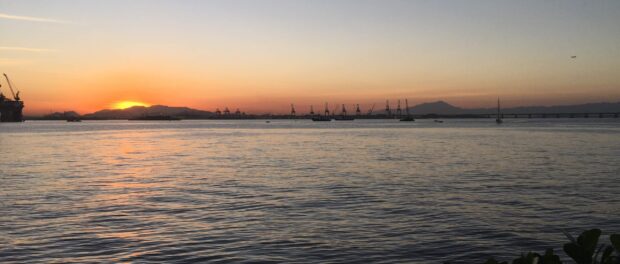
On August 4, environmental educators and activists whose work occurs in favelas throughout Rio de Janeiro’s North Zone, participated in a livestreamed discussion on Facebook and YouTube about their activities and the new challenges presented by the coronavirus pandemic. The event was organized by Baía Viva, an environmental advocacy group focused on the upkeep of Rio’s Guanabara Bay. All of the participants said that it was essential for favela residents to be involved in environmental issues in their own communities because of how those issues touch all aspects of life, including nutrition, health, housing, general well-being, and public safety.
The discussion was moderated by Sérgio Ricardo, ecologist and founder of Baía Viva. Other speakers included Edson Gomes, cofounder of Verdejar, an organization promoting sustainable socio-environmental development in the favelas of Complexo do Alemão and its neighboring Serra da Misericórdia forest in the North Zone; Leonardo Bueno, an activist from the North Zone’s Manguinhos favela with the Popular Front of Favelas for Democracy; Julia Rossi, coordinator of the Green Maré project within the organization Redes da Maré in the North Zone; Jocelino Porto, coordinator of the Precious Stones Ecological Nucleus (NEPP), based out of the North Zone’s Honório Gurgel neighborhood; and Maria do Carmo, President of the Quitungo Cooperative, an organization in the North Zone’s Brás de Pina neighborhood that works with environmental advocacy and recycling.
Democratic participation from the residents is crucial, they argued. Rossi argued that only residents can truly understand their realities and challenges, saying that all activists should ask, “How does the favela express its own environmental fights?”
Along these lines, Gomes said that it is also important to break free from the typical narrative that the press establishes about favelas, which portrays them as problems and without agency. He stressed that people should not fall into the trap of thinking that “the fault is of those who live in the communities… It is very important for us not to blame poverty.”
Ricardo added that this view of the poor as at fault is a form of socio-environmental racism that is prevalent in how the formal city views the favelas.
Environmental education has played an important role in mobilizing residents to participate in cleanups and to decrease pollution and litter, the speakers pointed out. For Carmo, “[as favela residents] we see the need that exists for cleaning up the rivers, especially the Quitungo River,” which runs through her native Brás de Pina.
One of the fundamental methods of environmental education for favela residents starts in schools. However, Porto, who has been involved with the cause since 1992, lamented that under Mayor Eduardo Paes, it was harder for environmentalists to engage with schools. “They kept us away, and we didn’t want that,” he said.
During the pandemic, many environmental groups have stepped into virus response activities, and the speakers stressed the connection between environmental work and promoting public health. Rossi said the pandemic has made the importance of the longtime demands of food security and basic sanitation even more clear.
Despite many challenges, the speakers voiced optimism that they will be able to make the most of the situation. “We have to see how what today is viewed as a problem can turn into an opportunity for the communities,” said Gomes.
Continuing in this vein of seizing opportunities, Porto put forth a call to action, urging people to plant a tree during National Tree Week, which begins on September 21. He argued that even a small, individual action like planting a tree can serve as a solid step in the right direction.
For the final twenty minutes of the event, musician and environmental educator Bhega Silva of the Parque União favela in Maré, along with his daughter Thaina, joined and performed for the audience. As activists, many of their songs touched on the environment and favela empowerment, demonstrating music’s potential as an educational tool for raising awareness about environmental issues in Rio.


